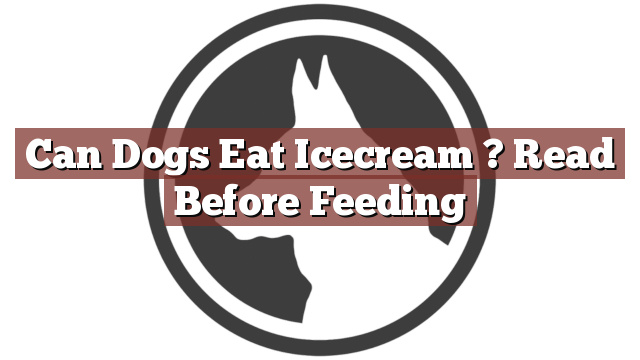Understanding Your Dog’s Dietary Needs
Dogs are not just our pets; they are part of our family. As responsible pet owners, it is crucial to understand their dietary needs to ensure their overall health and well-being. A balanced diet is essential for dogs, just as it is for humans. Providing them with the right nutrients in the right quantities is vital for their growth, development, and longevity.
A dog’s diet should primarily consist of high-quality dog food that is specifically formulated to meet their nutritional requirements. These commercial dog foods are carefully designed to provide the necessary proteins, carbohydrates, fats, vitamins, and minerals that dogs need. However, it is important to note that not all human foods are safe for dogs, and some can even be toxic to them.
Can Dogs Eat Ice Cream? Read Before Feeding
Can dogs eat ice cream? This is a common question that many dog owners have. While it may seem harmless to share a scoop of ice cream with your furry friend on a hot summer day, the answer is no. Ice cream contains several ingredients that are not suitable for dogs and can cause digestive issues, discomfort, or even more severe health problems.
One of the primary concerns with feeding ice cream to dogs is its high sugar content. Dogs have a different digestive system than humans, and their bodies are not designed to process large amounts of sugar. Consuming sugary foods can lead to obesity, diabetes, and other health issues in dogs. Additionally, ice cream often contains artificial sweeteners like xylitol, which is extremely toxic to dogs and can cause a dangerous drop in their blood sugar levels.
Pros and Cons of Feeding Ice Cream to Dogs
Feeding ice cream to your dog may seem like a treat, but it is essential to consider the potential risks and benefits before doing so.
Pros: Ice cream can provide temporary relief from the heat, and the cold sensation can be soothing for dogs. Sharing a small amount of plain, vanilla ice cream occasionally may not cause any immediate harm, especially if your dog does not have any underlying health conditions.
Cons: On the other hand, the cons outweigh the pros when it comes to feeding ice cream to dogs. The high sugar and fat content can lead to weight gain, digestive issues, and pancreatitis. Moreover, certain flavors of ice cream may contain ingredients like chocolate, raisins, or nuts, which are toxic to dogs and can cause serious health problems.
It is always best to consult with your veterinarian before introducing any new food into your dog’s diet to ensure their safety and well-being.
Conclusion: Make Informed Choices for Your Dog’s Health
While it may be tempting to share your favorite dessert with your beloved dog, it is crucial to prioritize their health and well-being. Ice cream, with its high sugar and fat content, is not suitable for dogs and can potentially harm their digestive system and overall health. Instead, focus on providing a balanced and nutritious diet specifically designed for dogs.
Remember, the most important thing is to make informed choices when it comes to your dog’s diet. Consult with your veterinarian to determine the best food options for your dog based on their age, breed, size, and any pre-existing health conditions. By doing so, you can ensure that your furry friend remains happy, healthy, and by your side for years to come.
Thank you for taking the time to read through our exploration of [page_title]. As every dog lover knows, our furry friends have unique dietary needs and responses, often varying from one canine to another. This is why it's paramount to approach any changes in their diet with caution and knowledge.
Before introducing any new treats or making alterations to your dog's diet based on our insights, it's crucial to consult with a veterinarian about [page_title]. Their expertise ensures that the choices you make are well-suited to your particular pet's health and well-being.
Even seemingly harmless foods can sometimes lead to allergic reactions or digestive issues, which is why monitoring your dog after introducing any new food item is essential.
The content provided here on [page_title] is crafted with care, thorough research, and a genuine love for dogs. Nevertheless, it serves as a general guideline and should not be considered a substitute for professional veterinary advice.
Always prioritize the expert insights of your veterinarian, and remember that the health and happiness of your furry companion come first.
May your journey with your pet continue to be filled with joy, love, and safe culinary adventures. Happy reading, and even happier snacking for your canine friend!

